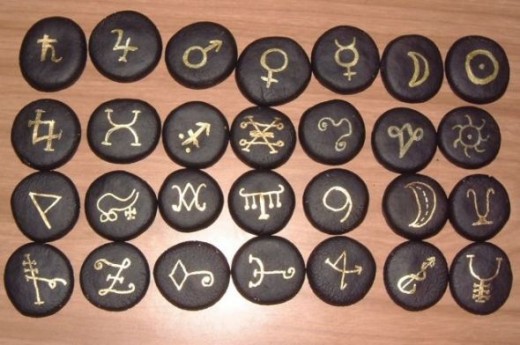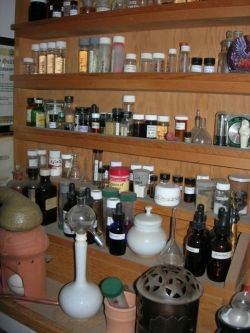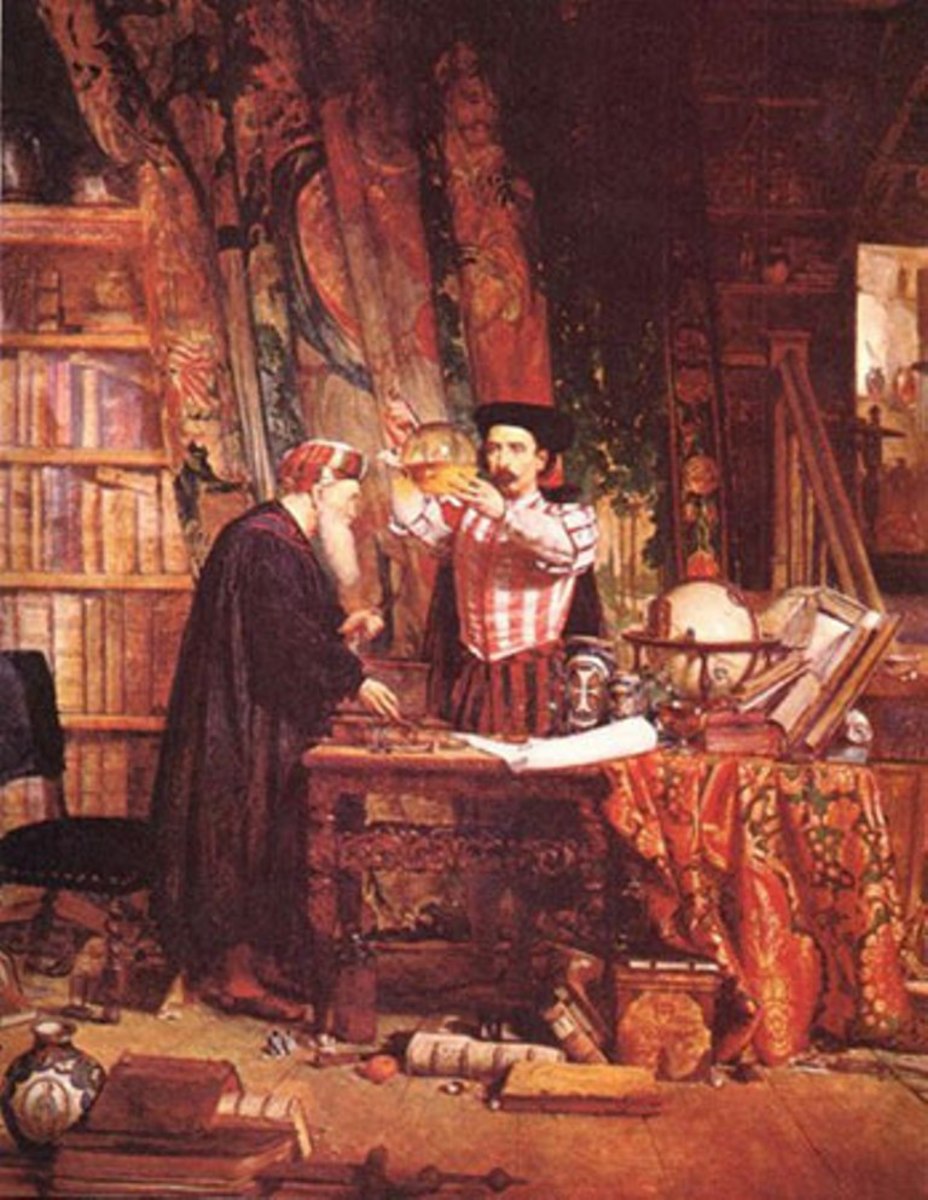I'm An Alchemist

As Above, So Below
Alchemy can't be defined as a specific thing. That's probably part of the large appeal it has for me. With roots that date back to ancient Egypt, alchemy as a scientific pursuit and spiritual practice has moved across the globe, passing through different cultures as people work to understand the natural world and how it works, and make a connection with that knowledge to those parts of the Universe and Nature that just don't always have a rational explanation.
I was at a women's goddess temple in the fall of 2009 when another woman asked me "what" I was. My mouth opened and I told her I was an alchemist. That was the first time I had answered a question like that so directly and quickly and the self-reflection and introspection I did over the rest of my visit revealed a journey I had been on for several years and a path I know is a very good fit for me as I move forward into the future.
But almost no one I know is also an alchemist and when I say so, it's clear that people think I'm kind of weird. But being an alchemist isn't weird, it's just a more rare tradition these days, but one that is open to both logic and faith, science and magic, the ancient and the modern.
Fire Circle Alchemy - a modern context for inner alchemical workings
My introduction to alchemy came from meeting a multi-denominational group of alchemists at a Pagan festival in California. They all are into alchemy in some way or another and come together into a codified fire circle ritual at various gatherings around the US and the world to share and do inner alchemical work. The events are co-created, a sort of collaborative improvisation that grows from a few "con-seed-erations" that give the interactions some structure.
The idea is that no one is leading what is happening, and each person is both an alchemist and their own prima materia, working to bring themselves in-line with their own highest vision. It's like having a sober party with anywhere from 50 to 100 of your best friends where you are trying to let go of that which you don't need in your life, turning your lead into gold while all your friends help you. Not to mention, each one of them is also doing their own version of that at the same time, with you helping all of them. Here's a short video of what that can sometimes look like.

ORA, LEGE, LEGE, LEGE, RELEGE, LABORA ET INVENIES
Pray, Read, Read, Read, Read Again and You Shall Find
For a long time in human history, having real, genuine knowledge of how the world worked was considered heretical. Sometimes this was considered to be knowledge that only God was supposed to have, and sometimes it just went against whatever the present ruler in power was saying. Interestingly, knowing how the world really works today still carries a lot of stigma.
Alchemy predated chemistry with ideas that substances and material could be turned from one into the other. The most famous metaphor in alchemy relates to the transformation of lead into gold, turning a base material into a pure one. To that end, just about everything in alchemy follows that premise, and that's if you are talking about doing laboratory experiments or working on improving yourself. In fact, those two processes are viewed as being metaphors for each other.
After my first alchemical fire circle, I started to read a lot about alchemy, just about anything I could get my hands on. I found there is no one right way or method in alchemy. While it can be a spiritual path on its own, for the most part, a lot of the alchemists throughout history practiced some other form of spirituality and did their alchemy right alongside it. That's part of why so much of alchemical history is transmitted as art and the imagery always changes while depicting the same things. Islamic alchemists used their references and images, Christian alchemists used their own metaphors and symbols, Jewish alchemists adapted their records to reflect their history and language. But in the end, all those alchemists were trying to pass along the same messages, keeping the knowledge cloaked and concealed in safe pictures that reflected their own specific times, cultures and practices.
When you look at the really skilled alchemists of the past, they all had one thing in common: a strong liberal arts education. What is now somewhat maligned in the early 21st century as not being specialized enough is in fact an extremely strong and flexible knowledge base that allows the practitioner to master many skill sets and synthesize a lot of original thought that winds up bridging the gaps in between. People who are drawn to alchemy like to read, like to learn and wind up amassing a very broad range of knowledge on a wide variety of subjects.
Laboratory Alchemy - working to perfect Nature
Alchemy formed a lot of the foundation for modern chemistry and yet it better acknowledged the strange things we can't always explain or understand in a much better fashion than science does. Whereas nearly every ancient alchemist was a chemist of some sort, many modern alchemists don't engage in any genuine laboratory practices.
One person who does is career-chemist and long-time alchemist Robert Bartlett. I first heard him lecture at the International Alchemy Conference and then later learned he lived only about an hour north of me, in Washington State. That fortunate development led to me taking his Prima workshop, providing an introduction to laboratory alchemy and working with plant materials. For those of you who can't travel to catch one of his classes or lectures, I recommend his two books. These are fantastic for not only explaining a lot of archaic alchemical knowledge in plain, modern English, but they also provide a lot more interesting lesson in alchemical chemistry than you could ever have dreamed of in high school.

I'm Into Alchemy Too!
What sort of alchemist are YOU?
The Pursuit Of Knowledge - from microcosm to macrocosm and back again

At the very start of this lens was the quote "as above, so below." This is one of the biggest maxims in alchemy. Like just about everything else, it's got layers of meaning behind it. In one sense, it demonstrates the connection of our immediate, tiny view of the world (the microcosm) with the larger function of the world (the macrocosm). It also implies that what happens in the heavens (astronomically or astrologically) has effects that ripple down to what is happening on Earth, and vice versa.
What this means is that in alchemy it is believed that small events in your personal life can have an effect on larger things in the world, and changes that happen in the world which don't seem to be connected to your reality can in fact have some effect even if they are happening on the other side of the planet. This brings more consciousness to intents and actions for an alchemist. We don't exist in a bubble, we are part of a larger, living system. The goal of alchemy is to harmonize with the world at large, working to help bring both it and ourselves to a higher state of perfection. This isn't something that you ask for someone else to do, or some other being, this is hard work that is understood to take lots of tries (with plenty of unsuccessful attempts and the knowledge that comes from that) and lots of effort.
Alchemical Information and Communities
- International Alchemy Conference
A convention/conference gathering alchemical practitioners from all disciplines and from around the world. - Spagyricus.com
In the tradition of Frater Albertus and PRS, Classes in Traditional Lab Alchemy and Spagyrics as taught by Robert Bartlett – Chemist, Alchemist and former Chief Chemist of Paralab and Paracelsus College - Vegas Vortex Home
The Vegas Vortex produces alchemical events and fire circle gatherings in Las Vegas. Gather to dance and drum in magical community from dusk til dawn.

An Alchemical Journey
visiting historical alchemy sites
One thing that I'm really excited about for my trip to the UK and France in July 2012 is that I'm going to be able to visit several places that have alchemical histories or are connected to alchemy in some way.
Glastonbury - this ancient site is the location of some church ruins where it is said that John Dee and Edward Kelly "found" some of the Philosopher's Stone just lying around in the ruins during a visit the two made to the town. There are also a pair of water springs, one white and one red, which fit into alchemical symbolism.
Ripley Scrolls - in 2011, an archivist digging around in some old stores at the British Science Museum made a rather remarkable discovery. Up until then, there were only 22 "Ripley scrolls," alchemical documents created by Scottish alchemist George Ripley. The museum found that they had a 23rd one just sitting in storage, uncatalogued and unknown. It's now on exhibit.
Chartres Cathedral - while the cathedral in Chartres, France is well-known for its stained glass, labyrinth floor and enduring history (it dates back to the 13th century), what many people don't know is that although a lot of the stone carvings are Christian in appearance and imagery, there are a good number of carvings which are illustrating alchemical processes step-by-step.
So, that was my confession that I'm an alchemist... what do you think? Do you know anyone else who follows some sort of alchemical practice? Do you?








